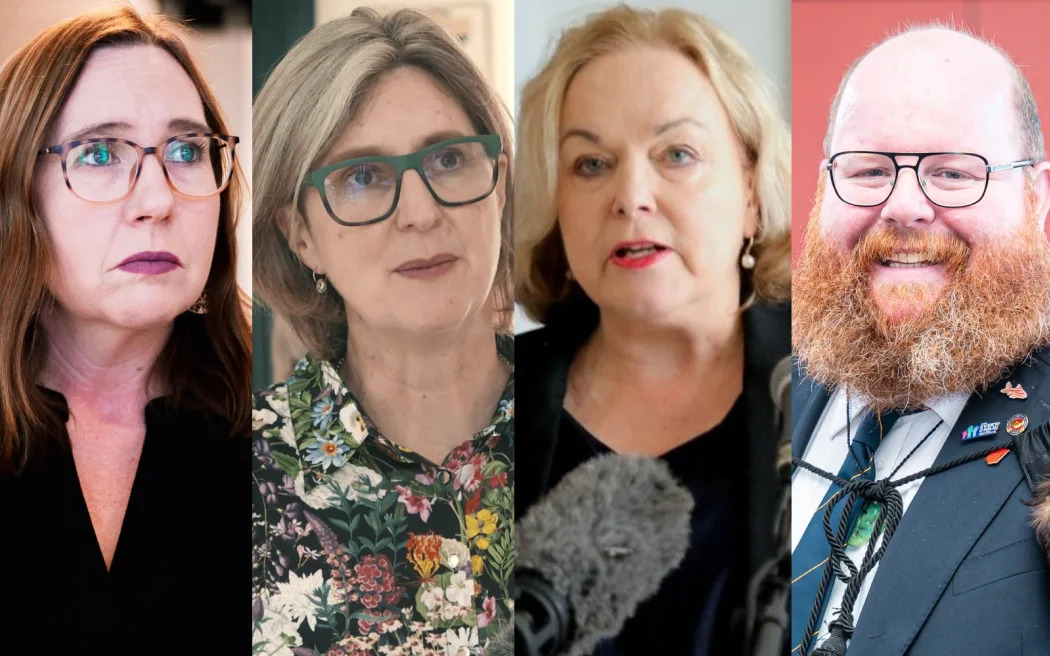
In an "open letter to the people of New Zealand", Collins expressed regret on behalf of the government to patients, students and families for the impact of the strike.
"We regret even more that the strike appears to be politically motivated by the unions" she said.
Collins called the strike a "coordinated attack".
Her letter fired up unions, particularly with its claim that the Post Primary Teachers' Association put Palestine ahead of students on an agenda list.
In early October, when the government tried to negotiate with the secondary teachers' union, the No.1 item on the PPTA's agenda for a meeting with Education Minister Erica Stanford was Palestine, Collins said.
"Palestine. Not terms and conditions. Not student achievement. Not the new curriculum. Palestine. That's not what students or parents should expect."
However, PPTA president Chris Abercrombie said the minister's office asked the union to send through a proposed agenda of what it would like to discuss, ensuring there was no overlap with issues that related to active claims as part of the bargaining process.
The union had four agenda items - Palestine, NCEA changes, AI marking and the curriculum.
Despite Palestine being at the top of the list, there was no particular order or priority, he said.
The meeting was cancelled and the PPTA was looking for a new time.
Abercrombie claimed Collins had a few issues wrong in her criticism of the teachers' dispute and he hoped her letter was based on a misunderstanding.
Collins also appealed to the estimated 6000-plus New Zealanders, who she said had had medical appointments and procedures postponed, due to the strike.
"I know some of you are living in pain, and in fear of a possible diagnosis that will now be delayed," she said. "This industrial action is unfair and unwarranted.
"The Government also has a responsibility to manage the country's finances carefully, especially when money is tight.
"From cancer drugs to social housing, from support for vulnerable people to conservation initiatives, there are thousands of appeals for increased spending, as well as for wage increases. The country is simply not earning enough to meet all these calls."
Salaried Medical Specialists Association executive director Sarah Dalton said she was disappointed that both Collins and the health minister misunderstood how negotiations are going.
"They're continuing to offer sub-CPI increases to doctors, as was offered last time and the time before," she said, "They're refusing to address known issues around recruitment and retention, particularly in small hospitals around the country, but also in a number of key sub-specialty areas."
The five percent increase offered to senior doctors was over a period of 28 months, which amounted to less than a two percent increase per year - below current inflation rates, Dalton said.
The government and state sector employers' "cavalier approach" to bargaining needed to be challenged, she said.
"I'm really sorry if people will miss out or have delays to their care on Thursday, but that happens every single day, and the government say nothing about that and refuse to address it,
"What we need is for politicians to listen to clinicians."
PSA union national secretary Fleur Fitzsimons said Collins was "playing politics" and called on the government to ensure employers come back to the bargaining table to settle the dispute.
"The minister has inflamed the dispute and the government has only itself to blame for the strike, because they have failed to listen properly to the concerns of health workers about safe staffing, about keeping themselves and patients safe, and delivering good care."
Ministers needed to stop the threats and "blame game", and take responsibility, Fitzsimons said.
Meanwhile, Abercrombie said the government still had time to avert Thursday's strike, by coming up with a suitable offer to teachers.
"There's 550 teachers short in secondary for next year," he said. "That's ministry figures.
"We've got a once-in-a-generation curriculum-assessment change coming up. so we need to make sure we've got a workforce to deliver that.
"We need to make sure our curriculum and our senior leaders are supported, we need to make sure our students' pastoral care is supported."
The government had made no offer on those key issues, Abercrombie said.














